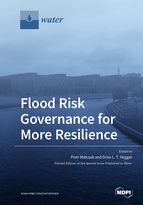Flood Risk Governance for More Resilience
A special issue of Water (ISSN 2073-4441). This special issue belongs to the section "Water Resources Management, Policy and Governance".
Deadline for manuscript submissions: closed (31 March 2020) | Viewed by 66009
Special Issue Editors
Interests: flood risk governance; biodiversity conservation; adaptation to climate change; sustainable urban and rural development; crisis management
Special Issue Information
Dear Colleagues,
Resistance-based strategies for flood risk management (FRM), based on controlling flood via structural infrastructure, laws and regulations, have been increasingly challenged in the last 20 years. Instead of seeking to remove the threat and to minimize societal and economic losses, new approaches embrace uncertainty and put emphasis on adaptation instead of control. Such resilience-based approaches address the need to absorb water and recover from floods and focus on the potential of societal systems to transform in response to stressors. There is emerging evidence that a diversification of flood risk management strategies addressing flood risk prevention through pro-active spatial planning, flood defence, flood mitigation, flood preparation and flood recovery contributes to more flood resilience.
Recent research efforts have significantly contributed to knowledge on the mechanisms through which a diversification and alignment of strategies takes place in different contexts. Different sub-themes have attracted attention. Firstly, the role of citizens and stakeholders in FRM has been investigated, in terms of public participation, collaboration, co-production, communication, perception of flood risk, etc. Secondly, FRM policies have been analyzed, investigating their structures, assumptions, and limitations. Additionally, the application of policies, their feasibility, and performance have been scrutinized. Thirdly, there are studies on particular FRM measures and tools, dealing with their applicability to policies and decision making.
A crosscutting issue in this area of research is the role of governance. FRM has become an increasingly reflexive preoccupation. Initially, FRM relied on top-down decisions, but it is now embedded in a dense network of relations, with stakeholders holding various powers, resources, and competences. It poses several, emerging questions on the governance role in FRM progress: How to integrate the traditional resistance measures with nonstructural approaches? How would cooperative natural-social sciences research advance the role of governance in building flood risk resilience? How to (re)conceptualize resilience to capture the governance and the resistance aspects of FRM? How could social experimentation approaches transform FRM? How to frame FRM to identify win-win situations where environmental (e.g., biodiversity conservation) and social (e.g., equality) aims are integrated?
This Special Issue invites contributions that look critically at flood risk governance, unpack some of the issues discussed above or identify important new research areas. We particularly welcome cross-disciplinary papers, within and across the domains of natural and social sciences.
Dr. Piotr Matczak
Dr. Dries L. T. Hegger
Guest Editors
Manuscript Submission Information
Manuscripts should be submitted online at www.mdpi.com by registering and logging in to this website. Once you are registered, click here to go to the submission form. Manuscripts can be submitted until the deadline. All submissions that pass pre-check are peer-reviewed. Accepted papers will be published continuously in the journal (as soon as accepted) and will be listed together on the special issue website. Research articles, review articles as well as short communications are invited. For planned papers, a title and short abstract (about 100 words) can be sent to the Editorial Office for announcement on this website.
Submitted manuscripts should not have been published previously, nor be under consideration for publication elsewhere (except conference proceedings papers). All manuscripts are thoroughly refereed through a single-blind peer-review process. A guide for authors and other relevant information for submission of manuscripts is available on the Instructions for Authors page. Water is an international peer-reviewed open access semimonthly journal published by MDPI.
Please visit the Instructions for Authors page before submitting a manuscript. The Article Processing Charge (APC) for publication in this open access journal is 2600 CHF (Swiss Francs). Submitted papers should be well formatted and use good English. Authors may use MDPI's English editing service prior to publication or during author revisions.
Keywords
- flood risk governance
- resilience
- stakeholders engagement
- policy transition
- flood risk reduction measures







